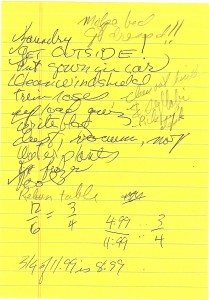
Argh! I’m busted, disgusted, and can’t be trusted! By yesterday morning, my discretionary budget was $2.26 in the black, with two days to go to the end of the budget cycle. But, having stayed out of grocery stores for a good two weeks, I was running out of food. I had to make a grocery run, leaving me with about a $25 shortfall for the month.
Thank goodness today is the end of this month’s budget cycle. Tomorrow is another day. A major grocery-run day, we might add.
Even after applying $700 from savings to cover the clothes shopping frenzy, I started this month’s budget very thin. Right off the bat, a dentist’s bill sucked $232 from my $800 allowance. That would have been tolerable. But then the air-conditioning guy blindsided me with a $467 bill, blithely doing some work at the downtown house without telling me first what it would cost.
$800 – $232 – $467 = not enough $ to live on for a month!
When you come right down to it, surviving only $25 in the red after the budget was reduced to $101 for a month’s worth of food, gasoline, dog care, and house maintenance is pretty amazing. With a few simple strategies (and some mildly onerous belt-tightening), I managed to get through the month without having to visit the pawn shop.
So, how can you cope when you see a budget shortfall coming your way?
1. Plan way ahead. While you’re in the black, realize that sooner or later a time will come when you’ll miss your budget goal.
• In flush times, stock up on staples and frozen food.
Example: Because my freezer was full of chicken, pork, beef, and fish bought in prior months, at no time this month did I have to buy meat. Pantry shelves also held enough pasta, rice, beans, and canned goods to supplement the frozen meat and veggies.
• Grow a garden. At the very least, have a few herbs and veggies growing in pots.
Example: Even though it’s the tail end of the season, the chard in the backyard has been edible all month. Thanks to the oranges on the trees, I haven’t had to buy juice all winter, and the lemons added to cooking and made salad dressings.
• Build an emergency fund. This should go without saying.
2. Leave the car in the garage. Don’t drive anywhere unless absolutely necessary, and when you do, plan trips to hit several destinations along the way, limiting the number of times you have to go out in the car. This has several benefits:
• Obviously, the less you drive, the less you’ll spend on gas.
• Not driving means staying out of stores. Staying out of stores preserves capital. You discover you can go a lot longer between grocery-store runs than you thought, and that those little repair jobs that might send you to Home Depot can wait for a while.
• If you walk to a grocery store, you can only carry so much home. This will limit your purchases to what you really need.
3. Eat at home. I’ll say that again: Eat at home!
• Never eat in restaurants when you’re short on cash.
• Brown-bag your lunch to work or school.
• Make your own bread to help save on grocery bills. It’s cheaper and tastes a lot better than most grocery-store loaves.
4. Eat well, but eat less. This is a good time to go on a diet.
• Cut portion sizes.
• Prepare dishes that lend themselves to leftovers, such as stews, roasts, and pasta dishes, and then be careful not to pig out the first time they appear on the dinner table.
5. Get off the sauce.
• A bottle of wine or beer is a hole into which to pour empty calories and money.
6. If you smoke, cut back as far as you can without suffering intolerable discomfort.
• A cigarette is a torch with which to set fire to cash.
7. Do without. If you don’t need something right this minute, chances are it can wait until after the budget crisis passes.
• A burned-out lightbulb, an empty bottle of vitamins, a dead triple-A battery can be replaced later.
8. Substitute creatively. If you run out of something you regard as crucial, look around for something that can take its place for awhile.
• Woolite or unscented dish detergent works well as shampoo.
• Ordinary hand cream is the same stuff that’s in expensive face creams.
• Hand soap worked into a thick lather works as well as shaving foam.
• Baking soda works in place of toothpaste.
• Vinegar substitutes nicely for Windex.
• Rice or pasta can take the place of potatoes, to good effect.
9. Return stuff. If you’ve recently bought something that you don’t need to use right away, take it back.
10. Drink water, coffee, or tea, not pop.
• Another good excuse to start a diet! Water is free; home-brewed ice tea or iced coffee is very cheap. All are better for you than soda pop.


